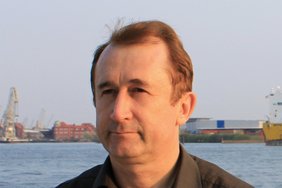In total, German institutions are involved in 18 of the 34 new Synergy Grants, including 7 Synergy Grants for Institutes of the Max Planck Society. The ERC Synergy Grants fund a group of two to maximum four Principal Investigators (PI) working together and bringing different skills and resources to tackle ambitious research problems. Prof Brovkin’s partners are Dr Mathias Göckede and Prof Martin Heimann from the Max Planck Institute for Biogeochemistry in Jena, Germany, and University of Helsinki, Finland, and Dr Annett Bartsch from b.geos GmbH in Austria. The funding is 10 Mio € in total, and about 3 Mio € for the working group at MPI-M.
Victor Brovkin’s research topic in his working group „Climate-Biogeosphere Interaction“ is the interaction of the land ecosystems with climate through numerous biogeophysical and biogeochemical feedbacks using a hierarchy of Earth-system models of different complexity. Ecosystems modify biophysical parameters of the land surface (e.g. the albedo), form specific spatial patterns, and contribute to the global cycling of carbon and nutrients through biogeochemical exchange with the atmosphere and ocean. Many climate-relevant biological processes such as plant successions, soil evolution, and accumulation of organic residues in wetlands involve alteration of land surface and abiotic environment on a long timescale.
With his ERC Grant corresponding PI Victor Brovkin and his partners wants to quantify the disturbance impacts on feedbacks between Arctic permafrost and global climate. Arctic permafrost has been identified as a critical element in the global climate system, since it stores a vast amount of carbon that is at high risk of being released under climate change. The feedbacks between permafrost carbon and climate change are moderated by many factors, including hydrology, topography, and biology. Shifts in these factors lead to highly complex feedbacks between biogeochemical and biogeophysical processes. These are only rudimentarily represented in current Earth System Models (ESMs), in particular due to a scaling gap between fine-resolution processes and coarse-resolution model grid.
Q-ARCTIC will establish a next generation coupled land-surface model that explicitly resolves highest resolution landscape features and disturbance processes in the Arctic. Model development will be synchronized with novel remote sensing methodologies linking landscape characteristics and change potential at an exceptional level of detail. Interdisciplinary observations at multiple spatiotemporal scales will deliver novel insight into permafrost carbon cycle processes. All modelling and observational components are essential for the project objective to generate an unprecedented process-based hindcast of glacial permafrost carbon state and projection of permafrost sustainability under future scenarios with a focus on abrupt changes. Victor Brovkin comments: ”Arctic landscapes accumulated huge amount of frozen organic carbon during the last glacial period, and served as a small natural carbon sink during the recent past. A net effect of warmer climate on Arctic ecosystems and carbon storage is highly uncertain. We will combine novel methodologies to answer the fundamental question on the role of permafrost in the Earth System”.
The consortiums ground-breaking research is based on the newly developed ICON-ESM using high-performance computing infrastructure. The required remote sensing information can for the first time be produced from new pan-Arctic data streams, such as the European Sentinel satellites. Finally, recent breakthroughs in ultraportable instrumentation and mobile air- and water-borne platforms facilitate bridging the gap between in-situ process understanding and landscape-scale surface-atmosphere exchange. The Q-ARCTIC PI-consortium will combine their world-leading expertise in these fields to close the scaling gap between high-resolution processes and the coarser ESM resolution.
Victor Brovkin’s professional career started in 1984 when he had received his diploma in mathematics from Lomonosov University in Moscow, from where he also received his Ph.D. four years later. After working in several research positions in Russia, he changed to the Potsdam Institute for Climate Impact Research (PIK) where he worked as a scientist from 1994 to 2008. Since 2008 he is group leader at MPI-M. He habilitated at the Universität Hamburg in 2011 and was appointed Professor at Universität Hamburg in 2015. Victor Brovkin is one of the Review Editors of the Sixth Assessment Report (AR6) of the IPCC, Working Group I. He is a member of Academia Europaea.
ERC press release:
https://erc.europa.eu/news/erc-2020-synergy-grants-results
Contact:
Prof Dr Victor Brovkin
Max Planck Institute for Meteorology
Phone: +49 (0) 40 41173 339
Email: victor.brovkin@mpimet.mpg.de

